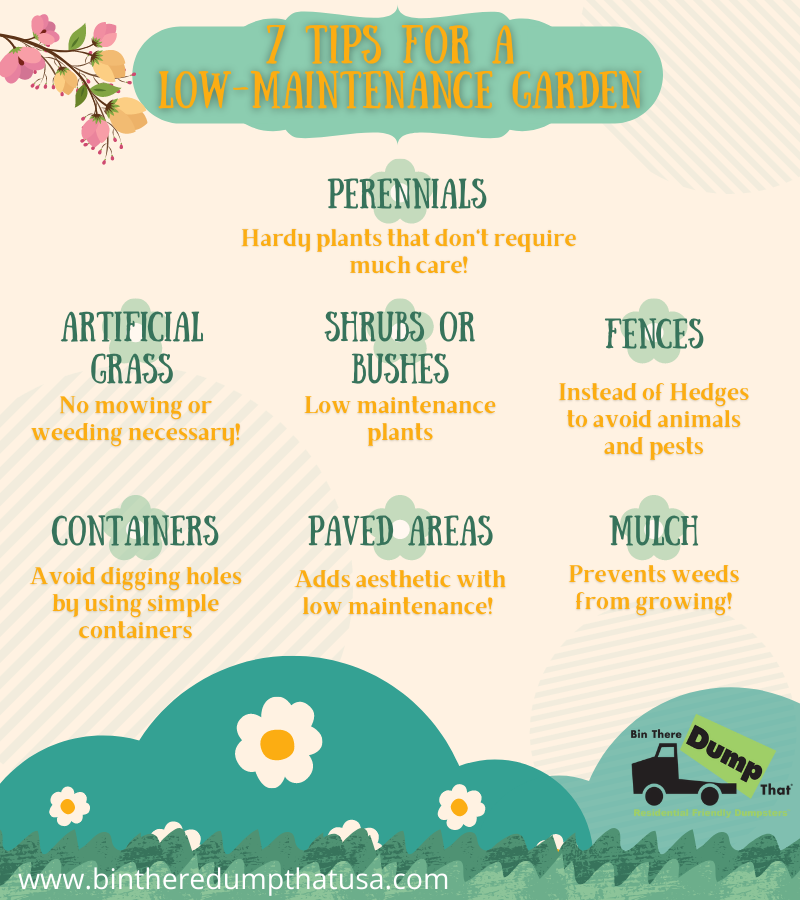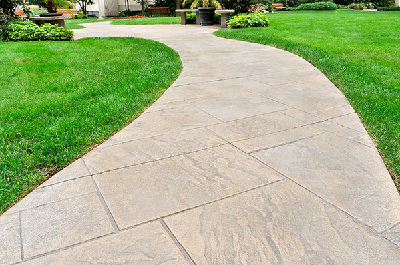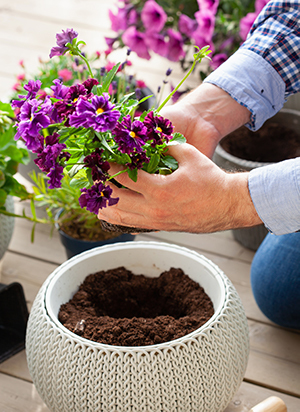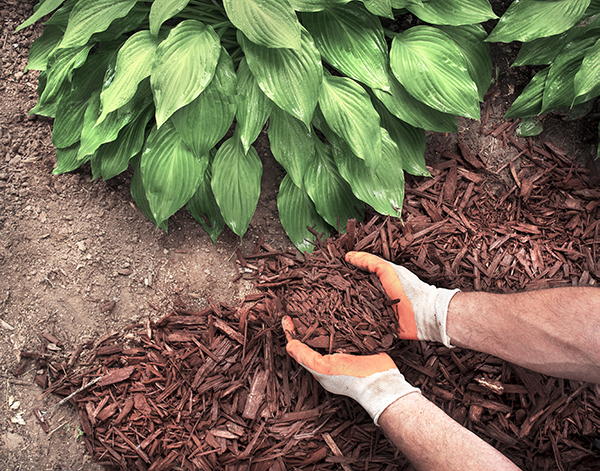
Life can be hectic, and most of us don’t have time to devote several hours every week to the upkeep of our gardens. That isn’t to suggest, however, that a garden can’t be low-maintenance while being stunningly attractive; it just takes a bit of thoughtful care and planning, that’s all.
And today, with all of the landscape design apps and technology we have at our fingertips, it has never been as easy to plan an awesome, low maintenance garden as it is today. On that note, here are seven tips to keep your garden looking great with minimal effort.

Unless you are one of those people who seem to have been born with green fingers, you will probably know just how hard it can be to keep plants and flowers alive in your garden. No matter how much information you read and how much care and attention you give them, sometimes, your favorite plants will just wither away and die - almost in the act of defiance.
Of course, the culprit in these scenarios is usually a lack of experience from the gardener, especially when it comes to some more fragile plants with very specific requirements. With that in mind, if you are going to cultivate a low maintenance garden, it’s a good idea to only stick to the hardy plants and trees that don’t require much care, such as perennials and evergreen shrubs like lavender and euonymus. Just be mindful of their growth patterns and maximum size. Working with land surveyors, you can determine the precise borders of your yard to make sure your resilient greenery doesn’t cross over into your neighbor’s garden.
Artificial grass is your best friend if you’re looking for an easy life as a gardener with a cheap low maintenance garden. Seeding, fertilizing, weeding, and mowing all become a thing of the past, and you can just sit back and admire your beautiful lawn all year round.
In addition to its low maintenance benefits, artificial grass offers an eco-friendly alternative, conserving water resources by eliminating the need for regular watering. Its durability ensures a lush, vibrant lawn that withstands diverse weather conditions, providing a consistent aesthetic appeal throughout the seasons.
Furthermore, artificial grass is an excellent solution for areas with challenging soil conditions, allowing for landscaping possibilities in places where natural grass struggles to thrive. Its UV-resistant properties guarantee long-lasting color, while the soft, non-abrasive surface makes it an ideal playing area for children and pets.
Consider embracing artificial grass to transform your outdoor space into a hassle-free, visually appealing haven. You can also get rid of furniture in certain areas and lay artificial grass over the top.
Shrubs and bushes are key elements for a successful low maintenance garden design. Extremely low-maintenance, these plants provide lovely natural shapes, requiring minimal pruning, while being pest and disease resistant.
They bloom consistently and tolerate various growing conditions. Whether evergreen or adorned with colorful flowers, all low-maintenance shrubs simply need adequate watering until they establish themselves in their new location.
Their adaptability and effortless care make them essential components for those seeking an aesthetically pleasing yet easy-to-maintain low maintenance garden design, catering to the needs of busy gardeners looking for a beautiful and hassle-free landscape.

If your garden has any paved sections, it’s better to leave them alone, especially when considering a low maintenance garden design. As you would know, these areas require very little maintenance (apart from a jet wash once or twice a year), which is ideal if you want to live a simple life.
Paved sections, when done right, can give a garden a distinct aesthetic while also providing a useful place for things like barbecues or a children’s play area - so think twice before you get rid of concrete in your garden. Incorporating these low-maintenance paved spaces into your overall low maintenance garden design can enhance the visual appeal and functionality of your outdoor space.
Strategically placing seating areas or decorative pots on these surfaces can further contribute to an easy-to-care-for yet stylish garden ambiance, ensuring a harmonious blend of form and function in your outdoor retreat.
Our Dumpster Consultants are waiting to help you find an affordable solution to your waste disposal needs; we can't wait to help you with your project!

Container gardening is the method of growing plants in containers instead of in the ground, which provides a vast array of benefits for those looking for an easier life with their garden. Rather than digging holes, trimming roots, and taking care of large plants, it’s much easier to manage everything from a handy little container instead.
On top of this, container gardening is ideal for urban locations where a full-fledged garden isn’t possible since it allows you to make the most out of a small area. An excellent option for a low maintenance garden.
Furthermore, container gardening offers the flexibility to rearrange plants easily, ensuring optimal sunlight exposure and changing the overall look of your space without extensive effort. It's a versatile approach that caters to various plant preferences, making it suitable for both ornamental and edible gardens. The controlled environment of containers also minimizes the risk of invasive plants, offering a hassle-free gardening experience.
Hedges can cause problems in gardens for several reasons. First, it can cause conflict between neighbors if they are used as a divider between properties since if you don’t do your share of the upkeep, it will negatively impact the people who live on the other side.
Secondly, lots of animals and pests find their homes in hedges. To avoid all of this, swap the hedges for fences and enjoy a much more straightforward life. Fences provide a clear property boundary without the potential disagreements associated with hedge maintenance.
Additionally, fences create a physical barrier that deters wildlife from making a home in your garden, minimizing the risk of pests and the need for constant hedge trimming. Choosing a fence over hedges not only simplifies property boundaries but also contributes to a cleaner, more controlled garden environment, allowing for a harmonious relationship with neighbors and a pest-free outdoor space.
Putting a layer of mulch down on your soil is an excellent way to prevent weeds from germinating by blocking their light and smothering them if they do manage to sprout. Mulch also helps prevent soil erosion, and it helps to keep the ground underneath both fertile and protected.
It’s a no-brainer if you want to keep your garden weed-free but ready for new plants. Moreover, mulch acts as a natural insulator, regulating soil temperature and preserving moisture. This not only promotes a healthier, more stable environment for plant roots but also reduces the frequency of watering, contributing to a more sustainable and water-efficient garden.
Additionally, as mulch breaks down over time, it enriches the soil with organic matter, enhancing its overall fertility and supporting the growth of vibrant, resilient plants. Choosing the right type of mulch for your garden can be a game-changer, offering long-term benefits beyond weed control and soil protection.

There’s no need to shy away from your garden projects! When you need to get rid of larger amounts of garden waste or debris, we have the perfect solutions to help you clean up. With these seven tips and ideas for a low maintenance garden, you can be sure you’ll grow a beautiful garden with minimal effort that you can be proud of.
Friendly, professional customer service, plus fair pricing, equals value.